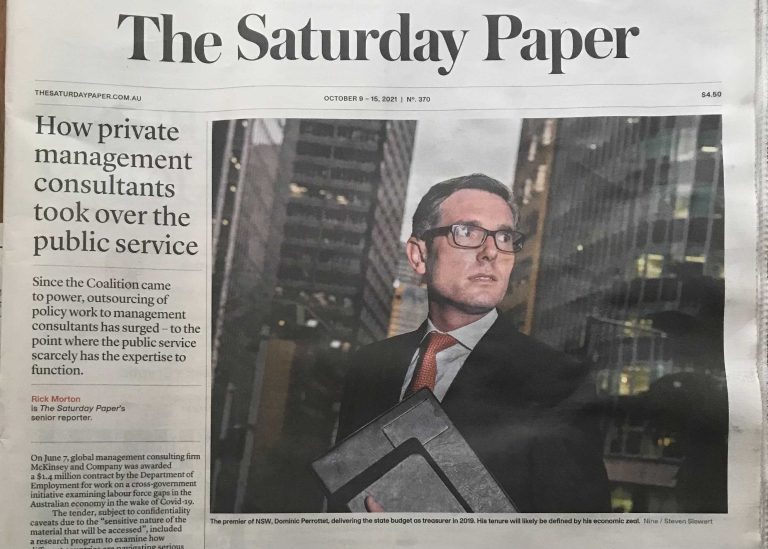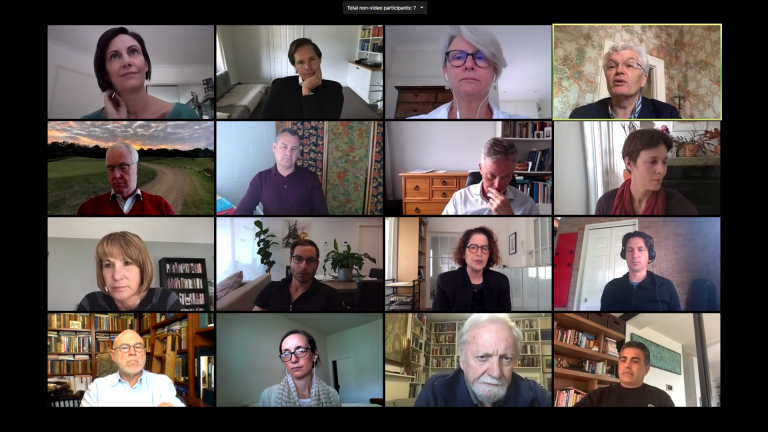Many government departments suffer from organisational obesity. Never mind the weight of young children, take a look at the amount of dead weight in government. Out-dated hierarchical systems designed to protect egos over-emphasise fear and worship of ministerial wants and desires and are fleeing from the role as expert adviser to become pandering ‘yes’ men and women.
Struggling with organisational dysfunction government systems revert to bland, neutral positions on most issues. Government documents edited via hierarchical management structures reach the Minister void of any real information. Policy development is the duty of a select few. Only a small number of academic experts, consultants and peak bodies are ever assembled to produce draft policy documents and associated paraphernalia. These are released for tokenistic public comment and consultation because the document is all but complete.
The size and the systems developed by government dehumanise its employees. Employees are grouped into mathematical terms – units, sectors, and divisions. They are trained to manage the public and to handle difficult telephone calls using telemarketing approaches. In workforces thousands strong, they have colleagues who they have never met, but email regularly.
This dehumanising of the workplace contributes to our society’s inability to engage with government and policy development. It means the community comes in contact with cynical and jaded bureaucrats who cannot undertake consultation of any depth because they probably don’t believe it will achieve much anyway. How can a workforce so removed from the dynamic operations of human society engage in those systems when they spend their working life adhering to structures that actively suppress them?
All this contributes to the challenge facing lobby groups, communities and policy advocates wishing to engage and influence their governing bodies. The size is most significantly a problem because it is confusing. Government systems are complex to understand, even for their employees. There are some strong examples in the community of how large organisations are better managed: organizations who through their structure and systems are achieving because they are not letting go of the humanness in the work they do.
Rural Australians for Refugees has grown to national recognition and has provided significant support to many refugees. What began as a small grassroots movement has become an effective nationwide advocacy and support network. This large and geographically diverse organisation works where others may have failed because it does not try to rigidly impose specific structures. Local communities develop their part of the organisation. They link via email, telephone and meetings and conferences with others to discuss their progress. A series of smaller networked groups with the same broad goals ensure power and influence is spread widely and not concentrated in a single office.
This organisation succeeds on the value of trust. Trust that everyone is doing their best, doing what they can, and consequently making identifiable and concrete differences to the lives of refugees on a personal level. In doing so, they provide a combined lobbying force that is impacting on government policy and the social conscience of our nation.
This model is organic in form, a form that should encourage large organisations to break up into smaller groupings with greater independence from the hierarchy. Smaller departments share common goals and understandings with each other, but maintain their decision making independence. This creates flexibility to work with each other in ways not beholden to a specific structure. It creates a situation that dissolves elements of the hierarchy and provides truly innovative responses to research and new policy directions that will turn a Minister’s head. Instead of everything being done for the benefit of government and its systems we need a structure focusing on what needs to be produced or provided to our society as a whole.
This fragmentation already exists in the form of local government. This is a form of government that in some cases struggles due to a lack of access to adequate resources. Currently, the power of local communities and their local government is hijacked by the lack of control they are given over the systems governing their lives.
Communities work hard despite the limited points of engagement they have with their local institutions. Parents advocate strongly on volunteer school boards, committees of management try to redirect their community health centre, and local government planning departments are a point of healthy argument and debate. Yet, the impact is limiting because of one-size-fits-all policy approaches dictated by state and federal government. All funding is specifically targeted and despite the best understanding of their needs, local communities are hamstrung by the three tiers of Australian governance.
Local politics, however, will always be a point of influence, perhaps an even greater influence in the future. In a world where oil becomes scarcer and more expensive, the need to work, access resources and exist more locally will grow. The Green Party’s foray into inner city local government areas demonstrates their belief in the value of local politics. There are many small gains to be made that contribute to the shifting of community consciousness, and the Green Party have a good track record. In the space of 20 years they have brought the environment to a point where it is a regularly identified community issue. They and others may be able to do the same by engaging in local government and local community activity.
Imagine a society where local government managed the direction and funding allocation to community health centres, schools and early childhood centres, their local parks, forests and environment. We know those who live in an area understand it more intimately than those making the decisions based in capital cities. We know that local communities understand their politics and have ways of working through issues that are unique to them. There is a need to revisit the macro-government structures in Australia and a hundred years on from Federation decide if the three tiers are really serving our needs.
We can find a hundred excuses as to why government shouldn’t or won’t change. But, if we are going to have a system of governance that serves us in a dynamic and honest way, rather than dictates to us, we must start demanding more. Australian politics and government needs to be brought to account by those that it governs. Not through elections, but through rigorous advocacy and community driven debate.



